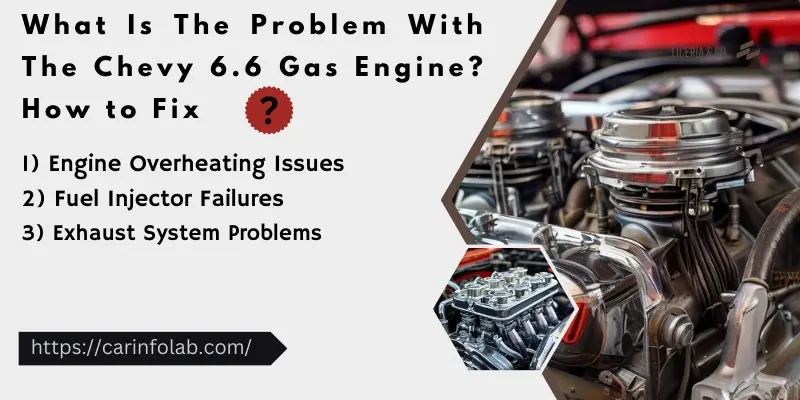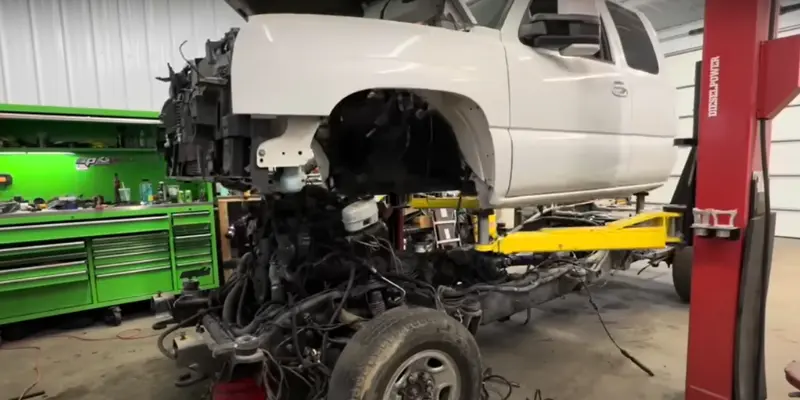What Is The Problem With The Chevy 6.6 Gas Engine? How to Fix
Updated: September 2, 2024
169
Are you facing Chevy 6.6 Gas Problems? The Chevy 6.6L gas engine is a popular choice for truck owners because it’s strong and doesn’t break down often. But like any engine, it can have problems and Clock Spring in a car is another major component. This article talks about the common problems people have with this engine and gives simple ways to fix them. Whether you know a lot about cars or just like to work on your truck, this guide will help you understand the issues and find solutions.
Overview of the Chevy 6.6L Gas Engine
The Chevy 6.6L gas engine is a V8 engine introduced by General Motors (GM) in 2020. It’s found in heavy-duty trucks like the Chevy Silverado 2500HD and 3500HD. This engine is praised for its power, providing 401 horsepower and 464 lb-ft of torque. It’s designed for towing and heavy-duty applications, making it a favorite among truck lovers.

The Chevy 6.6 gas engine is a popular choice among truck owners for its power and reliability. Whether you’re hauling heavy loads or simply enjoying a robust drive, this engine has been designed to meet demanding needs. However, like any mechanical system, it’s not without its issues. Understanding the common problems associated with the Chevy 6.6 gas engine can help you maintain your vehicle and avoid costly repairs.
Chevy 6.6 Gas Problems
Owning a Chevy 6.6 gas engine means dealing with its quirks. While it’s a robust and durable engine, a few issues tend to crop up more frequently than others. Identifying these problems early can save you from more significant headaches down the road.
1. Engine Overheating Issues
One of the most common problems Chevy 6.6 gas engine owners face is engine overheating. This issue can be alarming as it not only affects performance but can also cause long-term damage to your engine. Overheating is typically caused by an inadequate cooling system or a faulty thermostat.
- Fuel Injector Failures
Fuel injectors play a crucial role in the performance of your Chevy 6.6 gas engine. When they fail, you may experience poor fuel economy, engine misfires, and even difficulty starting your vehicle. This is another common issue that needs to be addressed promptly to avoid more severe engine problems.
- Exhaust System Problems
Exhaust system issues, including leaks and catalytic converter failures, are also prevalent in the Chevy 6.6 gas engine. These problems can lead to reduced engine efficiency and increased emissions, which could cause your vehicle to fail emissions tests. Addressing these problems is essential for maintaining the engine’s performance and complying with environmental regulations.
| Causes of Overheating |
|---|
|
| How to Fix Overheating Issues |
|---|
|
2. Fuel Injector Failures
Fuel injector problems can severely affect your engine’s performance. Recognizing the signs early can prevent further damage.
| Signs of Fuel Injector Problems |
|---|
|
| Steps to Fix Fuel Injector Issues |
|---|
|
3. Exhaust System Problems
Exhaust issues can affect both performance and emissions. Here’s how to deal with them.
| Common Exhaust System Issues |
|---|
|
| How to Address Exhaust Problems |
|---|
|
Common Problems and Solutions for the Chevy 6.6L Gas Engine
| Problem | Description | Solution |
|---|---|---|
| Fuel Efficiency Issues | Poor MPG, especially under load | Regular maintenance, proper tire inflation, clean air filters, smooth driving habits |
| Engine Knock | Knocking sound from the engine | Use high-quality fuel, clean fuel system, use fuel additives, replace knock sensor if needed |
| Oil Consumption | Excessive oil usage | Regular oil checks, use the recommended oil type, and check for worn piston rings or valve seals |
| Transmission Problems | Rough shifting, slipping, delayed engagement | Change transmission fluid, ensure correct fluid level, professional inspection, possible software update or rebuild |
| Cooling System Failures | Overheating due to radiator, water pump, or thermostat issues | Inspect the exhaust system, replace the faulty catalytic converter, and ensure the system is in good condition for emission tests |
| Exhaust System Issues | Reduced performance, increased emissions | Inspect the exhaust system, replace the faulty catalytic converter, and ensure the system is in good condition for emission tests |
Preventive Maintenance for the Chevy 6.6 Gas Engine
Regular maintenance is key to keeping your Chevy 6.6 gas engine in top shape. Here are some tips.
Oil Changes
Regular oil changes are crucial for keeping your engine running smoothly. Using high-quality oil and changing it according to the manufacturer’s recommendations can prevent many common engine problems.
“The Chevy 6.6 gas engine is powerful, but it does have its quirks. One common issue is the fuel efficiency dropping significantly under heavy loads. Regular maintenance is key to keeping this engine running smoothly.”John Anderson, Automotive Technician with 15 years of experience
Cooling System Flush
Flushing the cooling system removes old coolant and any contaminants that could cause clogs or corrosion. This should be done regularly to maintain the efficiency of the cooling system and prevent overheating.
Using High-Quality Oil
The type of oil you use can have a significant impact on your engine’s longevity. Choose from high-quality synthetic oil that offers better protection against wear and extreme temperatures.
Regularly Checking Engine Components
Routine inspections of engine components such as belts, hoses, and filters can help you catch potential issues before they become serious problems. Replace any worn or damaged parts as soon as possible to avoid costly repairs down the line.

The Importance of Addressing Problems Early
- Consequences of Ignoring Engine Issues
- Benefits of Early Detection and Repair
Should You Consider Upgrading the Chevy 6.6 Gas Engine?
In some cases, upgrading your engine may be a better option than repairing it. Here’s what to consider.
When to Consider an Upgrade
If your engine has high mileage or has experienced significant problems, it might be time to consider an upgrade. Upgrading can provide
- Improved performance
- Better fuel economy
- Increased reliability.
Pros and Cons of Engine Upgrades
| Pros |
|---|
|
| Cons |
|---|
|
Aftermarket Solutions for Enhancing Performance
If you’re looking to boost your engine’s performance, there are several aftermarket options available.
| Category | Description | Considerations |
|---|---|---|
| Popular Aftermarket Parts | – High-flow air filters – Performance exhaust systems – Upgraded fuel injectors – Improve performance by increasing horsepower and fuel efficiency | – Designed to enhance overall engine performance |
| Installing Performance Enhancements | – Ensure compatibility of aftermarket parts with your Chevy 6.6 gas engine – Professional installation is recommended for proper fitting and tuning | – Working with a professional mechanic ensures parts are correctly installed and optimized for performance |
Conclusion
The Chevy 6.6 gas engine is a powerful and reliable choice for truck owners, but like any engine, it has its share of issues. By understanding common problems such as overheating in a car, fuel injector failures, and exhaust system issues, you can take proactive steps to keep your engine running smoothly. Regular maintenance, timely repairs, and considering upgrades when necessary can help you get the most out of your Chevy 6.6 gas engine.
FAQs
What Are the Main Problems with the Chevy 6.6 Gas Engine?
Common issues include engine overheating, fuel injector failures, and exhaust system problems.
Is It Expensive to Maintain a Chevy 6.6 Gas Engine?
Maintenance costs can vary, but regular service and addressing issues early can prevent costly repairs.
Can I Fix Overheating Issues on My Own?
Some overheating issues can be fixed by upgrading the cooling system or replacing the thermostat, but more complex problems may require professional help.
How Do I Know If My Fuel Injectors Are Failing?
Symptoms include poor fuel economy, engine misfires, and difficulty starting. If you notice these signs, it’s time for an inspection.
What Are the Best Upgrades for the Chevy 6.6 Gas Engine?
High-flow air filters, performance exhaust systems, and upgraded fuel injectors are popular upgrades to enhance performance.
Please Write Your Comments